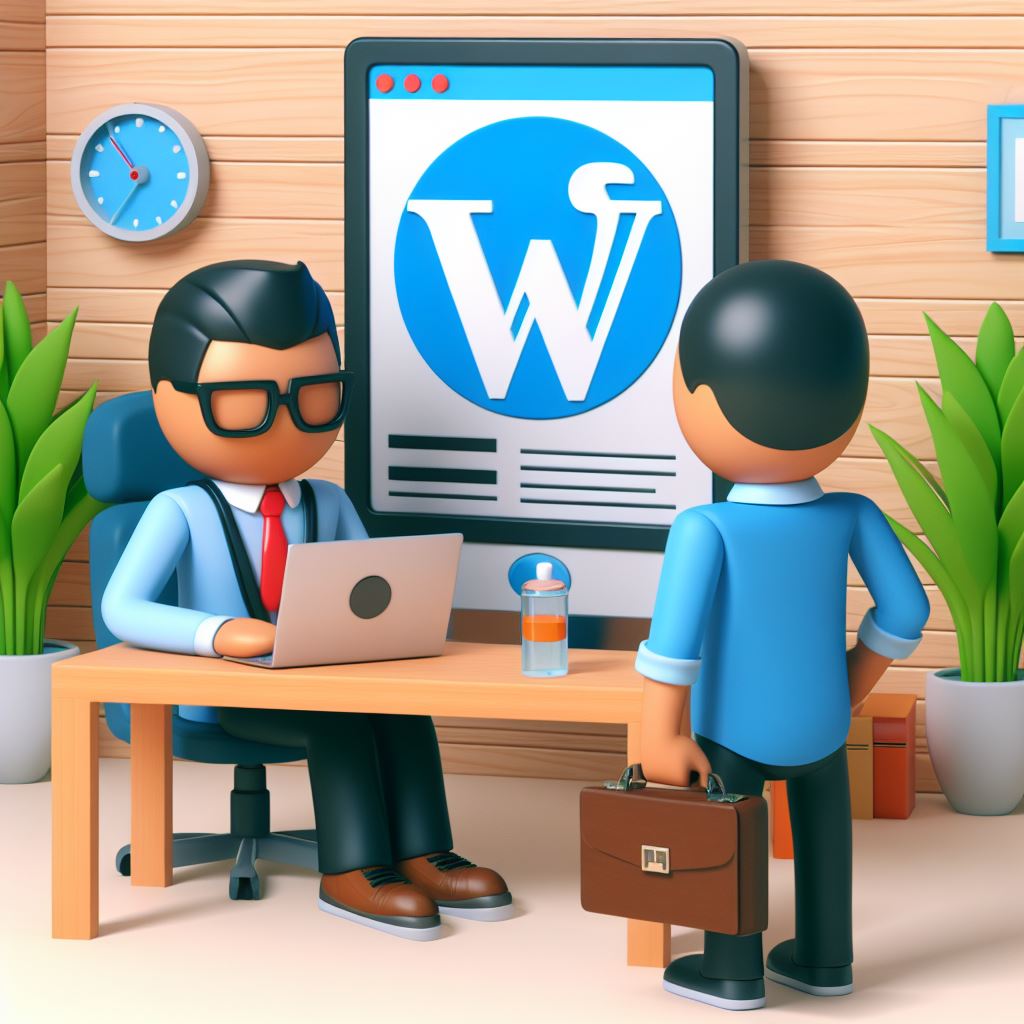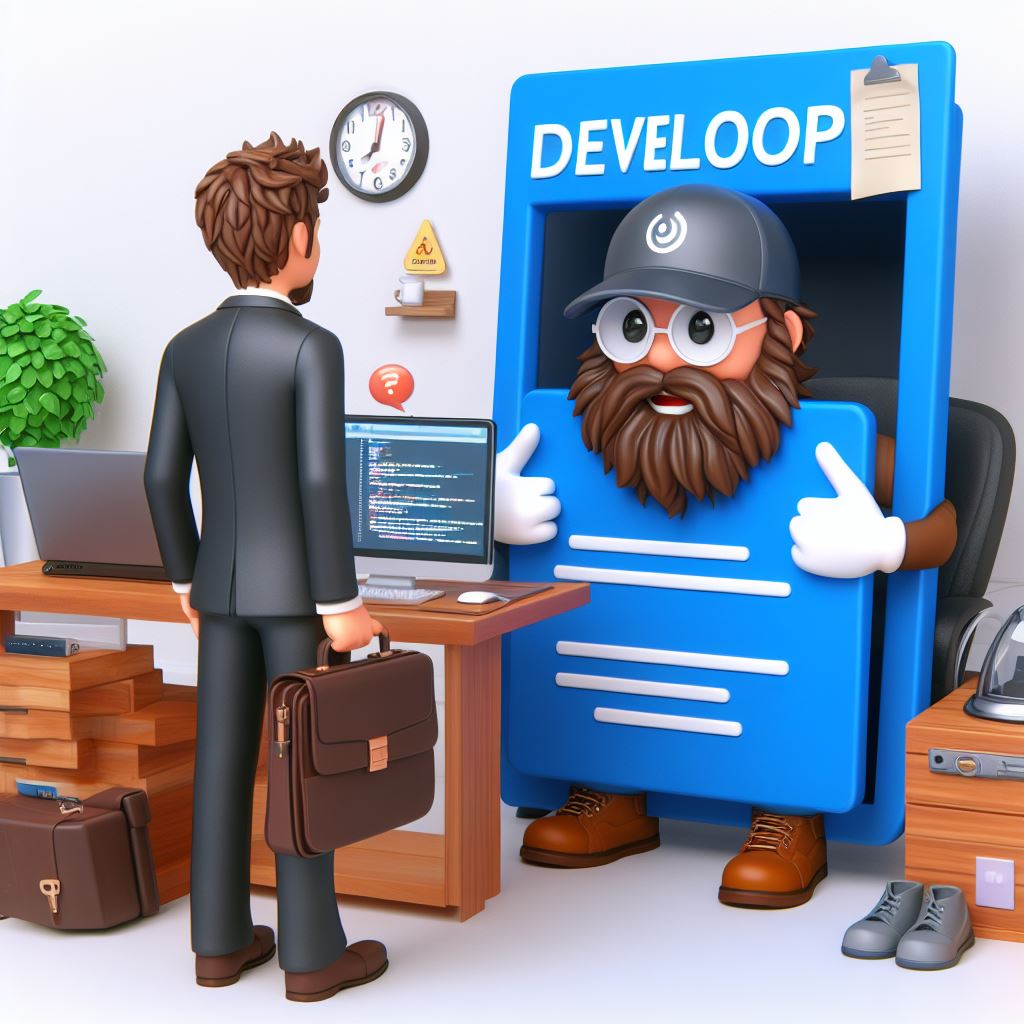Introduction
Welcome to the Thriving World of WordPress Development!
If you’re reading this, you’re probably on the exciting threshold of diving into the WordPress industry. This world is vibrant, ever-evolving, and full of opportunities for those who are passionate about creating and managing websites. WordPress, as you might already know, is the powerhouse behind a significant portion of the web, powering everything from personal blogs to large corporate websites. It’s a platform that offers flexibility, a user-friendly experience, and a community-driven approach, making it a top choice for both web users and developers alike.

In this final article of our series “How to Become a WordPress Developer,” we’re going to explore the various facets of transitioning into this dynamic industry. Whether you’re looking to join a team at a tech company, work with a creative agency, or even set sail as a freelance developer, the WordPress ecosystem has a place for you.
The Growing Demand for WordPress Developers
Did you know that WordPress powers over 40% of all websites on the internet? That’s right! With such a vast presence, the demand for skilled WordPress developers is constantly on the rise. Businesses and individuals are always on the lookout for talented individuals who can craft engaging, responsive, and effective websites. This demand creates a plethora of opportunities, making now a great time to jump into the field.
But what does it really take to become a part of this industry? How can you make your mark and stand out? Fear not! In the upcoming sections, we’ll delve into the types of roles available, how to build a resume that catches the eye, how to network effectively, and much more.
How to Understand the WordPress Job Market
Types of WordPress Roles
- Front-End Developers: Masters of the Visual Experience
- Imagine yourself as the artist behind the digital canvas, breathing life into websites with captivating designs and user-friendly interfaces. This is the domain of Front-End Developers, the orchestrators of the user’s experience. They wield their expertise in HTML, CSS, and JavaScript to transform raw code into visually appealing and interactive web pages. If you’re passionate about creating a seamless and aesthetically pleasing online experience, front-end development is your calling.
- Back-End Developers: The Architects of Server Logic
- While front-end developers focus on the visible aspects of a website, back-end developers are the behind-the-scenes wizards, ensuring the smooth functioning of a website’s backbone. They delve into the realm of databases, server-side logic, and APIs, ensuring that websites can handle data storage, user authentication, and real-time interactions. If you’re fascinated by the intricacies of server operations and the art of building robust web applications, back-end development is your path to success.
- Full-Stack Developers: Masters of the Digital Universe
- For those who crave a holistic understanding of the web development process, the role of a Full-Stack Developer beckons. These versatile professionals seamlessly blend front-end and back-end expertise, handling both the visual presentation and the underlying server-side logic. They are the ultimate problem solvers, capable of navigating the intricacies of both worlds and delivering complete web solutions. If you’re intrigued by the full spectrum of web development, full-stack development is your opportunity to shine.
- WordPress Support Specialists: The Problem-Solving Heroes
- In the realm of WordPress, support specialists are the unsung heroes, the pillars of customer satisfaction. They possess exceptional communication and technical skills, deftly navigating client queries, troubleshooting technical issues, and ensuring the smooth operation of WordPress websites. If you’re a patient, empathetic problem solver with a passion for helping others, WordPress support is your calling.
- Theme and Plugin Developers: Expanding WordPress’s Horizons
- For those with a creative spark and a penchant for innovation, the world of theme and plugin development beckons. These individuals are the visionaries who extend WordPress’s functionality and aesthetics, crafting custom themes that transform websites into unique digital creations. They also develop plugins that add specific features and enhance the overall user experience. If you’re a creative thinker with a knack for solving technical problems, theme and plugin development is your path to digital distinction.
Industry Sectors Hiring WordPress Developers
WordPress has revolutionized the way businesses, organizations, and individuals engage online. Its ease of use, flexibility, and vast plugin repository have made it a popular choice for building websites across diverse industries. As a result, the demand for WordPress developers is skyrocketing, offering an abundance of career opportunities for skilled professionals.

- Tech Startups Embracing WordPress’s Agility: Tech startups, with their penchant for innovation and rapid growth, are turning to WordPress to power their dynamic web presence. Its lightweight architecture and quick development cycles align perfectly with the agile methodologies that startups thrive on. WordPress’s ability to handle content management, user engagement, and e-commerce seamlessly makes it an ideal choice for startups seeking to build robust and user-friendly websites.
- E-commerce Giants Benefiting from WordPress’s Scalability: In the competitive e-commerce landscape, businesses demand a scalable and secure platform to support their growing online sales. WordPress, with its robust plugins and integrations, proves to be a resilient foundation for e-commerce websites. From managing product catalogs and customer interactions to facilitating secure transactions, WordPress empowers businesses to handle the complexities of online commerce.
- Educational Institutions Embracing WordPress’s Learning Flexibility: Educational institutions, with their focus on engaging and informative online platforms, are increasingly adopting WordPress. Its intuitive interface and customizable features allow institutions to create interactive learning portals, course management systems, and student engagement tools. WordPress’s versatility caters to the diverse needs of educational institutions, from K-12 schools to universities and training centers.
- Non-Profits Leveraging WordPress’s Community Spirit: Non-profit organizations, driven by their mission to make a positive impact, rely on WordPress to spread their message and connect with supporters. Its open-source nature and vast community support make it an affordable and accessible platform for non-profits. WordPress’s ability to manage content, engage donors, and promote social causes aligns perfectly with the goals of non-profit organizations.
Freelance vs. Full-Time Opportunities

As a skilled WordPress developer, you stand at the crossroads of two exciting career paths: freelancing and full-time employment. Each option presents a unique set of benefits and challenges, catering to different preferences and lifestyles. Let’s delve into the world of each path to help you make an informed decision.
- Freelancing: A Haven for Independent Spirits
- If the allure of flexibility, autonomy, and variety beckons, the world of freelancing awaits. As a freelance WordPress developer, you become your own boss, choosing projects that align with your interests and skills. You set your own hours, work from anywhere in the world, and enjoy the freedom to manage your time and workload as you see fit. This independence is particularly appealing to individuals who thrive in a self-directed environment, relish the challenge of finding and securing projects, and enjoy the satisfaction of building a successful freelance business.
- However, freelancing also comes with its share of responsibilities and challenges. You must actively seek out projects, market your skills, manage your finances, and handle administrative tasks such as invoicing and taxes. The income stream can be variable, depending on the availability of projects and your ability to secure them. Additionally, the lack of a steady paycheck can create financial uncertainties.
- Full-Time Employment: A Foundation for Stability and Growth
- For those seeking stability, consistent income, and a built-in support system, full-time employment in WordPress development offers a compelling alternative. As a full-time WordPress developer, you work under the guidance of a company, enjoying the security of a regular paycheck and access to benefits like healthcare, paid time off, and professional development opportunities. This stability provides peace of mind and allows you to focus on your craft without the constant pressure of securing projects.
- Full-time employment also fosters a sense of community and collaboration. You work alongside colleagues who share your passion for WordPress, providing opportunities to learn from experienced professionals, exchange ideas, and grow your skills. Additionally, full-time positions often involve more complex and challenging projects, allowing you to expand your expertise and push your limits.
How to Build a WordPress-Focused Resume
Highlight Relevant Skills and Experience
- Your resume should proudly display your technical prowess, showcasing your proficiency in the essential tools of the WordPress developer trade. Emphasize your fluency in programming languages like PHP, JavaScript, and CSS, the building blocks of web development. Don’t forget to mention your experience with WordPress-specific frameworks and tools, such as Gutenberg and WooCommerce.
- Demonstrate your deep understanding of WordPress and its ecosystem. Highlight your ability to customize themes, develop plugins, and troubleshoot common WordPress issues. If you’ve worked on complex WordPress projects, showcase your contributions and the impact you’ve made.

- While technical skills are essential, soft skills often play a decisive role in landing a job. Highlight your problem-solving abilities, your collaborative spirit, and your passion for continuous learning. These qualities will set you apart from the competition and showcase your adaptability and growth mindset.
- A strong portfolio is your visual resume, showcasing your best WordPress projects. Gather a selection of projects that demonstrate your skills and creativity, ensuring they align with the requirements of the job you’re seeking. Share your portfolio online, making it easily accessible to potential employers.
- Actively participate in WordPress communities and forums. Share your knowledge, answer questions, and engage in discussions. This demonstrates your passion for WordPress and your eagerness to learn from others.
- The WordPress landscape is constantly evolving, so embrace the spirit of continuous learning. Stay up-to-date with the latest WordPress features, plugins, and best practices. Take online courses, attend workshops, and participate in WordPress conferences. Your commitment to learning will impress potential employers and demonstrate your dedication to the craft.
Craft a Portfolio that Stands Out
A captivating portfolio stands as your most persuasive marketing tool. It serves as a tangible showcase of your skills, creativity, and problem-solving abilities, leaving a lasting impression on potential clients and employers.
- Curating a Compelling Collection of Projects
- Variety is Key: Showcase a diverse range of projects that demonstrate your versatility and ability to tackle challenging assignments. From e-commerce platforms to educational websites, let your skills shine in a variety of domains.
- Quality over Quantity: While quantity may seem impressive, focus on projects that showcase your best work. Ensure each project is thoroughly explained and highlights your unique contributions.
- Presenting Your Work with Visual Appeal
- High-Quality Images: Replace generic placeholder images with professional screenshots or mockups of your projects. Use visually appealing presentations that capture attention and showcase the user experience.
- Interactive Storytelling: Engage visitors with interactive elements like embedded videos or live demos. Allow them to experience the functionality and user-friendliness of your work firsthand.
- Aesthetic Cohesiveness: Maintain a consistent visual style throughout your portfolio, ensuring a cohesive and professional presentation. Use visually appealing templates or customize your own design to reflect your expertise.
- Communicating Your Achievements
- Clear Descriptions: Provide detailed descriptions of each project, highlighting the challenges you faced, the technologies you employed, and the results you achieved.
- Testimonials and Case Studies: Include testimonials from satisfied clients or case studies that demonstrate the positive impact of your work. These social proof elements enhance your credibility.
- Promoting Your Portfolio
- Online Portfolio Website: Create a professional portfolio website using WordPress or a dedicated portfolio platform. Ensure it is responsive and optimized for search engines to improve visibility.
- Social Media Presence: Share your portfolio projects on social media platforms like LinkedIn and Twitter and showcase your work to a wider audience. Engage with industry peers and potential clients.
- Networking Events: Attend WordPress conferences, meetups, and networking events to share your portfolio and connect with potential employers or clients.
- Portfolio’s Lasting Impact
- Your portfolio is an evolving document that reflects your growth and expertise. Regularly update it with new projects, showcasing your latest skills and accomplishments. Treat it as a living testament to your passion for WordPress development and your dedication to delivering exceptional results.
Tailoring Your Resume for Different WordPress Roles

Crafting a compelling resume is so important for landing that dream job. However, simply submitting a generic resume for every application is unlikely to yield positive results. Instead, tailoring your resume to each specific role demonstrates your genuine interest in the position and showcases your suitability for the tasks involved.
- Developer Roles: Highlight Your Technical Prowess
- For developer roles, prioritize showcasing your technical skills and expertise in core WordPress functionalities, including PHP, JavaScript, and CSS. Emphasize your experience with WordPress-specific frameworks and tools, such as Gutenberg and WooCommerce. If you’ve developed custom themes or plugins, highlight their features and the impact they have had on websites.
- Design Roles: Showcase Your Visual Expertise
- When applying for design roles, prioritize your portfolio, which should be a visual feast showcasing your design skills. Highlight your ability to create visually appealing and user-friendly websites that align with the brand identity of the clients or companies you’ve worked with. Emphasize your experience with WordPress page builders and theme customization techniques.
- Support Roles: Emphasize Communication and Problem-Solving
- For support positions, highlight your exceptional communication and problem-solving skills. Describe your experience in handling customer inquiries, troubleshooting WordPress issues, and providing clear and concise solutions. If you’ve worked in customer-facing roles, emphasize your ability to empathize with users and resolve their issues in a timely and professional manner.
- Tailoring Your Resume for Each Application
- By tailoring your resume to each specific role, you show potential employers that you’ve taken the time to understand their needs and are a genuine fit for the position. This demonstrates your initiative, attention to detail, and dedication to success.
Including Certifications and Continuous Learning
Staying ahead of the curve is not just a choice; it’s a necessity. Demonstrating your commitment to continuous learning is a key factor in showcasing your dedication to the craft and your ability to adapt to the ever-changing demands of the industry.
- Highlighting Your Certifications:
- Certifications serve as tangible evidence of your expertise and proficiency in specific WordPress skills and technologies. List any relevant certifications you’ve earned, such as the WordPress Developer Certified Professional (WP-DevPress) or the WooCommerce Certified Expert. These certifications demonstrate your commitment to mastering the latest WordPress developments and your ability to apply your knowledge in real-world projects.
- Sharing Your Learning Journey:
- Emphasize your involvement in WordPress-related courses, workshops, and online tutorials. Mention the topics you’ve explored, the skills you’ve acquired, and the projects you’ve applied your newfound knowledge to. This demonstrates your proactive approach to learning and your enthusiasm for expanding your skillset.
- Attending WordPress Events:
- Active participation in WordPress conferences, meetups, and online communities is a testament to your engagement with the WordPress ecosystem. Discuss the insights you’ve gained from these events, the networking opportunities you’ve seized, and the collaborations you’ve fostered. This showcases your passion for the community and your dedication to staying connected with the latest trends and developments.
- Continuous Learning: A Never-Ending Journey:
- Infuse your resume and cover letter with examples of your ongoing learning journey. Mention online courses you’ve enrolled in, blogs you follow, and books you’ve read related to WordPress development. This demonstrates your commitment to personal growth and your willingness to invest in your own professional development.
Testimonials and References
Testimonials from satisfied clients or employers serve as powerful endorsements, showcasing your expertise, professionalism, and the positive impact you’ve had on their projects. By incorporating testimonials into your resume and portfolio, you elevate your credibility and establish yourself as a trusted WordPress developer.

- Learn to Select Compelling Testimonials:
- Relevance: Choose testimonials that align with the specific role or project you’re applying for. This demonstrates your suitability for the requirements of the position.
- Authenticity: Testimonials with specific examples and quantifiable results carry more weight. They highlight your ability to deliver tangible outcomes.
- Varied Perspectives: Include testimonials from different clients or employers to showcase your versatility and adaptability.
- Learn to Include Testimonials Effectively:
- Placement: Strategically place testimonials in your resume or portfolio to capture attention and highlight your strengths.
- Context: Provide context for each testimonial, explaining the project or task it pertains to. This enhances the credibility of the endorsement.
- Visual Appeal: If possible, incorporate testimonials into visually appealing formats, such as quotes or videos. This makes them more engaging and memorable.
- Learn to Offer References
- References from reputable individuals serve as a cornerstone of trust, allowing potential employers or clients to verify your skills, work ethic, and professionalism. Having a network of reliable references demonstrates your commitment to building strong professional relationships.
- Preparing for Reference Requests:
- Clear Communication: Inform your references in advance that you may be asked for their recommendations. This gives them time to prepare their feedback.
- Provide Context: Briefly explain the type of position you’re applying for and highlight your relevant skills and experience. This provides references with a better understanding of your background.
- Express Gratitude: Thank your references for their willingness to provide recommendations. Their support speaks volumes about your reputation and professionalism.
- Testimonials and References: A Symbiotic Duo
- Testimonials and references, when used effectively, form a powerful alliance in showcasing your expertise and professionalism. Testimonials provide authentic endorsements, while references offer firsthand accounts of your work ethic and contributions. By leveraging both, you establish yourself as a highly sought-after WordPress developer, ready to take on challenging projects and deliver exceptional results.
Start Networking and Building Connections
Networking isn’t just about exchanging business cards; it’s about building relationships, sharing knowledge, and opening doors to new opportunities.
How to Leverage Social Media Platforms
In today’s interconnected world, social media platforms serve as powerful tools for networking. LinkedIn, Twitter, and even Instagram can be your virtual town squares, connecting you with industry veterans, fellow enthusiasts, and potential clients.

- Follow Industry Leaders: Engage with the profiles of influential WordPress figures, read their insightful posts, and participate in their discussions. This demonstrates your passion for the community and your eagerness to learn from experts.
- Share Your Expertise: Don’t be shy to showcase your own knowledge and achievements through blog posts, tutorials, or social media updates. Share your experiences, highlight your unique approach to WordPress, and attract the attention of others.
- Join Relevant Groups and Forums: Seek out WordPress-specific groups and forums on social media platforms. These online communities offer opportunities to ask questions, seek guidance, and exchange ideas with like-minded individuals.
Start Attending WordPress Meetups and Conferences
While social media is great for virtual connections, nothing beats the power of face-to-face interactions. WordPress meetups and conferences provide the perfect setting to connect with fellow enthusiasts, learn from experts, and expand your network.
- Attend WordCamps and Local Meetups: WordCamps, local WordPress meetups, and developer conferences are regular events that attract a diverse group of individuals passionate about WordPress. Attend these events, participate in workshops, network during breaks, and engage in discussions.
- Volunteer or Give Talks: Don’t just be an attendee; take an active role in the community. Volunteer your time to help with event organization or give a presentation on a topic you’re knowledgeable about. This will make you stand out and attract attention.
- Explore Online Communities: Online forums like WordPress.org’s forums, Stack Exchange, and even Reddit’s WordPress communities provide a platform to connect with individuals from all over the world. Engage in discussions, offer assistance, and share your expertise to build lasting connections.
Join WordPress Online Communities and Forums
Working on projects together is a fantastic way to build strong bonds within the WordPress community. Whether it’s contributing to open-source projects, teaming up for hackathons, or collaborating on freelance projects, these shared experiences create lasting connections and friendships.
- Contribute to Open-Source Projects: Involve yourself in open-source WordPress projects by contributing your code, offering feedback, or testing new features. This provides you with valuable experience, exposes you to a wider range of expertise, and fosters connections with fellow developers.
- Team Up for Hackathons: Participate in WordPress hackathons, where participants come together to create websites or plugins within a limited timeframe. These events provide opportunities to collaborate, learn from others, and make new friends.
- Freelance Projects: Leverage your WordPress skills to take on freelance projects. Working with clients from various backgrounds and industries will broaden your experience, enhance your skills, and create lasting professional connections.
Build Your Personal Brand to Stand Out from the Crowd
In a competitive industry, showcasing your expertise and building a strong personal brand can set you apart from the competition.
- Start a Blog or Create Tutorials: Share your knowledge and experience by creating a blog or publishing tutorials on WordPress-related topics. This demonstrates your expertise, attracts potential clients, and establishes you as a valuable resource in the community.
- Speak at Events: Share your knowledge and passion by speaking at WordPress meetups, conferences, or even online webinars. Engaging with an audience and sharing your insights will enhance your reputation and attract more opportunities.
- Become a Contributor: Get involved in the WordPress community by becoming a contributor to official documentation, translating WordPress resources, or participating in bug bounty programs. This demonstrates your commitment to the community and your willingness to give back.
Prepare Yourself for Interviews
Common Interview Questions for WordPress Developers
Interviews can be daunting experiences, especially for WordPress developers eager to showcase their expertise. However, by understanding common interview questions and preparing insightful responses, you can confidently navigate the interview process and leave a lasting impression.
Question 1: Can you walk us through your experience with WordPress?
This question assesses your overall proficiency and passion for WordPress development. Highlight your technical skills, including experience with front-end and back-end development, theme customization, plugin development, and PHP, JavaScript, and CSS knowledge. Demonstrate your understanding of WordPress concepts like widgets, menus, and user roles.
Question 2: How do you approach a new WordPress project?
Explain your systematic approach to tackling new WordPress projects. Emphasize the importance of understanding the client’s requirements, gathering project information, and creating a detailed project plan. Discuss your methodology for analyzing the project’s technical aspects, selecting the appropriate tools and technologies, and breaking down complex tasks into manageable steps.
Question 3: What’s the most challenging WordPress project you’ve worked on, and how did you handle it?
Select a project that showcases your problem-solving skills and ability to adapt to challenging situations. Describe the project’s complexity, the technical obstacles you faced, and the strategies you employed to overcome them. Emphasize your ability to think creatively, research solutions, and work collaboratively with team members.
Question 4: How do you stay updated with the latest WordPress trends and updates?
Demonstrate your commitment to continuous learning and staying at the forefront of WordPress development. Mention your preferred sources for keeping up with the latest trends, updates, and security patches. Discuss your participation in online forums, conferences, and workshops and your involvement in the WordPress community.
Demonstrate Your Technical Skills
Technical interviews are crucial for WordPress developers seeking to showcase their skills and land their dream job. While these interviews can vary in format and complexity, they all aim to assess your technical proficiency, problem-solving abilities, and ability to apply your knowledge to real-world scenarios.

Brush Up on Core Skills:
To effectively navigate technical interviews, it’s essential to have a strong foundation in core WordPress development concepts. This includes proficiency in:
- PHP: Familiarity with PHP’s syntax, data structures, and error-handling mechanisms is essential for building robust WordPress themes and plugins.
- JavaScript: JavaScript is crucial for creating interactive front-end elements, handling user interactions, and optimizing page load times.
- CSS: CSS is the language of styling and formatting WordPress websites, ensuring a visually appealing and user-friendly experience.
- Theme Customization: Be able to customize WordPress themes to match specific client requirements, ensuring they are compatible with the latest WordPress versions.
- Plugin Development: Demonstrate your ability to develop custom plugins to extend WordPress functionality, tackle complex tasks, and integrate various components.
Prepare Yourself for Code Challenges:
Technical interviews often involve practical coding challenges to assess your problem-solving skills and ability to translate theoretical knowledge into practical applications. To prepare:
- Practice and Familiarity: Regularly practice coding exercises and familiarize yourself with common WordPress APIs and functions.
- Clean Code: Emphasize clean, well-structured, and commented code that is easy to understand and maintain.
- Debugging Skills: Demonstrate your ability to identify and rectify code errors, ensuring the functionality and stability of your applications.
Leveraging Project Experience:
Your previous WordPress projects are valuable assets in technical interviews. Be prepared to discuss:
- Project Details: Provide a concise overview of the project, including its goals, challenges, and the technologies used.
- Technical Contributions: Highlight your specific contributions to the project, such as theme development, plugin integration, or performance optimization.
- Problem-Solving Approach: Describe how you approached and resolved technical challenges, demonstrating your troubleshooting and analytical skills.
Share your Knowledge of WordPress Resources:
Familiarity with the WordPress Codex and official developer resources demonstrates your commitment to staying up-to-date with the latest WordPress trends, best practices, and security guidelines. Be prepared to discuss specific resources that you rely on for information and guidance.
Be Ready to Present Past Projects and Contributions
Your past projects are tangible proof of your abilities. Be prepared to discuss the specifics: the challenges you faced, the solutions you implemented, and the outcomes. If you’ve contributed to open-source projects or the WordPress community, highlight those experiences. They show not only your technical skills but also your commitment to the WordPress ecosystem.
Don’t underestimate the power of soft skills. Questions like “How do you handle tight deadlines?” or “Can you give an example of how you’ve worked in a team?” assess your ability to fit into the company culture and work effectively with others. Reflect on your experiences and be ready with anecdotes that illustrate your communication skills, teamwork, and time management.
Interview Preparation Tips

- Do your homework: Research the company or client, understand their business and get a feel for their company culture.
- Practice makes perfect: Conduct mock interviews with friends or mentors, and practice articulating your thoughts clearly and confidently.
- Prepare questions: Interviews are two-way streets. Prepare thoughtful questions about the role, the team, or the company’s vision for WordPress.
Continuous Learning and Skill Upgrading
Continuous learning is the key to unlocking new skills, enhancing your expertise, and becoming a true WordPress superstar. Let’s explore strategies to transform yourself into a lifelong learner and thrive in this ever-evolving field.
- Keeping Up with WordPress Updates and Trends
- WordPress is like a river, constantly flowing and changing. To stay afloat, you need to keep up with its latest updates and trends. Regularly check out the WordPress News section, follow WordPress-focused blogs, and subscribe to newsletters from leading WordPress experts. Podcasts and webinars are also fantastic ways to stay informed while you’re on the go. Remember, the WordPress community is vibrant and always buzzing with new ideas – being an active part of it keeps you in the loop.
- Enhancing Your Skills with Advanced Courses
- Learning never stops, especially in the tech world! Consider enrolling in advanced WordPress courses to deepen your expertise. Platforms like Udemy, Coursera, and even WordPress-specific sites offer a plethora of courses covering advanced development, security, e-commerce solutions, and more. These courses not only enhance your technical skills but also add significant value to your resume.
- Contributing to WordPress Core and Community Projects
- One of the best ways to learn is by doing. Contributing to WordPress core, themes, plugins, or translating WordPress into different languages can be incredibly rewarding. It’s a chance to work with seasoned developers, understand the inner workings of WordPress, and give back to the community. Plus, contributions look great on your resume and can open doors to new career opportunities.
- Attending Workshops, Meetups, and Conferences
- There’s nothing like learning in a room full of enthusiastic WordPress folks. Workshops and meetups offer hands-on learning experiences, while conferences like WordCamps bring together WordPress enthusiasts from all over the world. These events are perfect for learning new skills, getting insights into the industry, and, of course, networking.
- Experimenting and Personal Projects
- Don’t forget the power of personal projects. Experiment with new plugins, try building a theme from scratch or start your own WordPress blog. These projects allow you to apply your skills in a practical setting and can lead to innovative solutions and creative breakthroughs.
- Staying Curious and Open-Minded
- Lastly, the best tool in your learning arsenal is your curiosity. Be open to exploring new areas within WordPress. Whether it’s diving into headless WordPress, exploring block development, or understanding website accessibility, there’s always something new to learn.
Conclusion
- Embrace the Future of WordPress Development: Congratulations on making it through this guide! By now, you’re armed with a wealth of knowledge and ready to make your mark in the WordPress world. As we wrap up this journey, let’s reflect on what lies ahead for you as a WordPress developer and the boundless opportunities that await.
- The Future of WordPress Development: The landscape of WordPress is always evolving, and with it, the roles and opportunities for developers. The rise of new technologies like headless CMS, the growing importance of website accessibility, and the ever-changing SEO landscape are just a few areas where WordPress is expected to grow and evolve. Staying adaptable, continually learning, and embracing change are keys to thriving in this dynamic field.
- Encouragement for Aspiring WordPress Professionals: As you step out into the world of WordPress development, remember that every expert was once a beginner. The journey might seem daunting at first, but with perseverance, curiosity, and a passion for learning, you’ll find your path. The WordPress community is known for its supportive and collaborative nature, so don’t hesitate to reach out, ask questions, and share your experiences.
- A World of Possibilities Awaits: Whether you dream of being a freelance developer, joining a leading tech company, or starting your own WordPress-focused agency, the possibilities are endless. Your unique combination of skills, creativity, and perspective is what will set you apart in this industry. Keep building, keep exploring, and keep pushing the boundaries of what you can achieve with WordPress.
Final Thoughts
As we close this chapter, remember that this is just the beginning of your adventure. The world of WordPress is vast and full of opportunities to grow, both professionally and personally. Keep nurturing your passion, stay connected with the community, and never stop learning. Your WordPress journey is yours to shape, and we can’t wait to see where it takes you.
Keep up the good work ????????

Do you like this article? Share it and send us your feedback!Check out our articles page, where you might find other interesting posts. Also, if you want to learn more about business, check out the WPRiders Blog!



